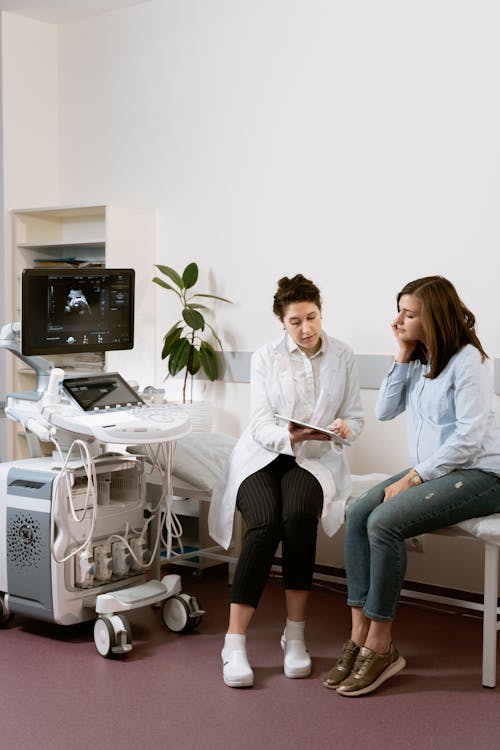As soon as you find out you’re pregnant, you want to do everything possible to ensure your baby’s health. The most critical aspect of your body’s upkeep during the initial trimester is your health, seeing as its protecting and nurturing a rapidly developing fetus. So, what are the recommended first three months of pregnancy dos and don’ts?
During the first trimester of your pregnancy, there are foods or beverages you can consume and others you’ll have to avoid. Besides taking vaccinations like the flu shot, you’ll have to be particular about the activities you can handle. Take prenatal vitamins and folic acid, a lot of rest, but don’t smoke, take alcohol or clean the cat’s litter box.
It can be intimidating to look at the list of dos and don’ts during the first three months of pregnancy. But most of the recommendations can be summed up as taking proper care of your body. You won’t be pregnant forever, and the following tips will ensure your baby bump results in a healthy, happy child.
What Are the Dos and Don’ts of the First Trimester of Pregnancy?
Your pregnancy will last around 40 weeks and, when grouped into three, results in trimesters. The first trimester covers the time from conception to the 12th week. During this period, your body undergoes many changes to prepare for the fetus’s growth.
Understanding these changes and attending to concerns every week helps you to prepare for the months ahead. You’ll need to know what to eat, which prenatal tests are due, and the expected weight gain. Like every mum-to-be, you’ll do everything in your power to make sure your pregnancy stays healthy.
In the first three months of pregnancy, your body releases hormones that impact each of your organs. After missing your period and depending on your physiology, you’ll start experiencing exhaustion, nausea, vomiting, and mood swings. Other subtle signs can include heartburn, headaches, constipation, tenderness in your breasts, and cravings or revulsions by certain foods.
You can avoid a miscarriage, congenital disabilities, or preterm labor by taking precautions during the first trimester of your pregnancy. While many of these you’ll be doing throughout the nine months, dos and don’ts include;
Do Start Thinking of Food as Fuel
If your body is a vehicle, then it carries the most precious cargo. As such, you want to give it the best fuel to eliminate any chance of breakdowns. Food is that energy source, and you should be selective of what you eat in the first three months of pregnancy.
When planning your meals, think rainbow colors, mix dark green spinach, blueberries, orange carrots, yellow bananas, and red apples. Brightly colored foods offer high levels of antioxidants and nutrients, plus you’ll be giving your baby variety that reduces cravings.
I would recommend drinking water and not caffeine. Miscarrying in the first trimester is more common, and too much coffee is thought to cause this.
Do Follow Up on Your Folate and Vitamins
Start Folic acid supplements are better taken in advance of pregnancy, but you can start if you haven’t already. Take 600 micrograms of the iron delivery system to protect your baby from anencephaly and spina bifida congenital disabilities.
Prenatal vitamins also provide the requirement of folate while also delivering much-needed iron, zinc, and calcium. In addition, the growing baby benefits from two types of omega-3 fatty acids. These are EPA or eicosapentaenoic acid and DHA or docosahexaenoic acid.
Do Moderate Exercise and Sufficient Sleep
When you’ve been exercising regularly before getting pregnant, keep up the regime. As a solution to combating hormonal changes and mood swings, exercise helps prevent insomnia and weight gain. Even when your workouts have fallen behind before conceiving, you can still adopt a more active, healthier lifestyle.
Early pregnancy can also leave you feeling exhausted as your body undergoes the strain of forming a new baby. Hormonal changes also contribute to your emotional and physical energy levels during the first-trimester growth of your bump. Take frequent naps and set early bedtimes so you can give your system a solid eight or nine hours of sleep.
Do Get Vaccinated and Visit the Dentist
The Center for Disease Control encourages pregnant women to get a flu shot early during the first three months. A highly contagious virus, influenza, can negatively affect your pregnancy, as your body is prone to hormonal changes. Your lungs, heart, and immune systems get weakened, and contracting the disease raises the risk of premature labor and other complications.

The American Congress of Obstetricians and Gynecologists recommends that you get a dental checkup during early pregnancy. It’s safe to undergo x-rays and teeth cleaning while pregnant, and obstetrician-gynecologists encourage oral exams during the initial prenatal clinic visits.
Don’t Drink Alcohol or Smoke
It’s time to quit the good times once you’re pregnant, especially if you smoked cigarettes. Tobacco contributes to a higher risk of miscarriage and lower birth weights. Smoking risks congenital disabilities like cleft lip and palate, preterm births, and infant death, even after your precious baby is born. The same applies to e-cigarettes, which contain harmful amounts of nicotine unsafe for your pregnancy.
In that same breath, no amount of alcohol is safe when you’re pregnant, especially in the first three months. Your baby can have abnormal growth, central nervous system issues, and abnormal facial features from drinking within the first trimester. Fetal Alcohol Spectrum Disorders or FASDs are possible intellectual and behavioral disabilities resulting from consuming alcoholic beverages.
Keep Away from Sources of Toxoplasmosis
Handling raw chicken or meat and cat litter boxes exposes your fetus to a pregnancy-debilitating disease caused by the toxoplasma gondii parasite. That is a leading cause of miscarriage and congenital disabilities. You can avoid Toxoplasmosis by cooking such foods thoroughly and staying away from kitty poo.
Conclusion
Don’t east for two as you risk weight again for you and your unborn baby, but stay hydrated to prevent dizziness, headaches, and kidney stone formation. If you are battling hemorrhoids and constipation, or if your urine is dark yellow, drink more water. When you feel tired, take a breather and ask for help with daily tasks, which helps your baby grow.

I’m Cathrine and I’m a 39-year-old mother of 3 from Utica, New York. And I’m extremely happy you’ve come to visit my hide-out on the web. Here I post about everything related to family-life and usually it will involve babies and lessons I’ve learned over the years from experts, friends, and my own mistakes. So hopefully you will find what i write fun and informational!

